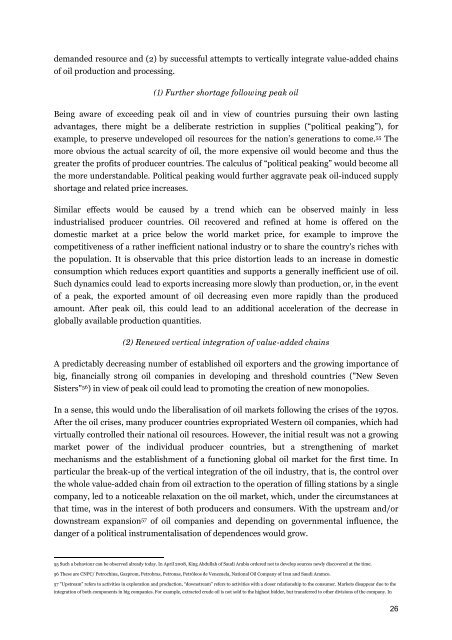PEAK OIL
PEAK OIL
PEAK OIL
Create successful ePaper yourself
Turn your PDF publications into a flip-book with our unique Google optimized e-Paper software.
demanded resource and (2) by successful attempts to vertically integrate value-added chains<br />
of oil production and processing.<br />
(1) Further shortage following peak oil<br />
Being aware of exceeding peak oil and in view of countries pursuing their own lasting<br />
advantages, there might be a deliberate restriction in supplies (“political peaking”), for<br />
example, to preserve undeveloped oil resources for the nation’s generations to come. 55 The<br />
more obvious the actual scarcity of oil, the more expensive oil would become and thus the<br />
greater the profits of producer countries. The calculus of “political peaking” would become all<br />
the more understandable. Political peaking would further aggravate peak oil-induced supply<br />
shortage and related price increases.<br />
Similar effects would be caused by a trend which can be observed mainly in less<br />
industrialised producer countries. Oil recovered and refined at home is offered on the<br />
domestic market at a price below the world market price, for example to improve the<br />
competitiveness of a rather inefficient national industry or to share the country's riches with<br />
the population. It is observable that this price distortion leads to an increase in domestic<br />
consumption which reduces export quantities and supports a generally inefficient use of oil.<br />
Such dynamics could lead to exports increasing more slowly than production, or, in the event<br />
of a peak, the exported amount of oil decreasing even more rapidly than the produced<br />
amount. After peak oil, this could lead to an additional acceleration of the decrease in<br />
globally available production quantities.<br />
(2) Renewed vertical integration of value-added chains<br />
A predictably decreasing number of established oil exporters and the growing importance of<br />
big, financially strong oil companies in developing and threshold countries ("New Seven<br />
Sisters" 56 ) in view of peak oil could lead to promoting the creation of new monopolies.<br />
In a sense, this would undo the liberalisation of oil markets following the crises of the 1970s.<br />
After the oil crises, many producer countries expropriated Western oil companies, which had<br />
virtually controlled their national oil resources. However, the initial result was not a growing<br />
market power of the individual producer countries, but a strengthening of market<br />
mechanisms and the establishment of a functioning global oil market for the first time. In<br />
particular the break-up of the vertical integration of the oil industry, that is, the control over<br />
the whole value-added chain from oil extraction to the operation of filling stations by a single<br />
company, led to a noticeable relaxation on the oil market, which, under the circumstances at<br />
that time, was in the interest of both producers and consumers. With the upstream and/or<br />
downstream expansion57 of oil companies and depending on governmental influence, the<br />
danger of a political instrumentalisation of dependences would grow.<br />
55 Such a behaviour can be observed already today. In April 2008, King Abdullah of Saudi Arabia ordered not to develop sources newly discovered at the time.<br />
56 These are CNPC/ Petrochina, Gazprom, Petrobras, Petronas, Petróleos de Venezuela, National Oil Company of Iran and Saudi Aramco.<br />
57 "Upstream" refers to activities in exploration and production, “downstream" refers to activities with a closer relationship to the consumer. Markets disappear due to the<br />
integration of both components in big companies. For example, extracted crude oil is not sold to the highest bidder, but transferred to other divisions of the company. In<br />
26


